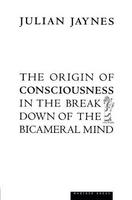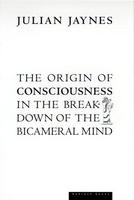The Origin of Consciousness in the Breakdown of the Bicameral Mind
The Origin of Consciousness in the Breakdown of the Bicameral Mind is a 1976 book by the Princeton psychologist, psychohistorian and consciousness theorist Julian Jaynes (1920-1997). It explores the nature of consciousness – particularly "the ability to introspect" – and its evolution in ancient human history. Jaynes proposes that consciousness is a learned behavior rooted in language and culture rather than being innate. He distinguishes consciousness from sensory awareness and cognition. Jaynes introduces the concept of the "bicameral mind", a non-conscious mentality prevalent in early humans that relied on auditory hallucinations. In his book, Jaynes examines historical texts and archaeological evidence to support his theory. He places the origin of consciousness around the 2nd millennium BCE and suggests that the transition from the bicameral mind to consciousness was triggered by the breakdown of the bicameral system. The bicameral mind, he explains, was characterized by individuals experiencing auditory hallucinations as commands from gods, guiding their actions. The book gained attention and was well-received upon its release. It generated positive book reviews, including mentions by notable critics such as John Updike and Christopher Lehmann-Haupt. The theory proposed by Jaynes influenced philosophers like Daniel Dennett and Susan Blackmore, as well as researchers studying schizophrenia. Jaynes's ideas on consciousness and the bicameral mind have been explored in various conferences, publications, and discussions over the years.In addition to numerous reviews and commentaries, there are several summaries of the book's material, for example, in the journal Behavioral and Brain Sciences, and in lectures and discussions published in Canadian Psychology. While the book sparked debates and controversies, it has left a lasting impact on the study of consciousness and human psychology. Some critics argued against Jaynes's views, questioning his assumptions and interpretations. Nonetheless, the book remains a thought-provoking exploration of the origins of consciousness, language, and culture, and it has continued to inspire discussions and research in these areas. It was Jaynes's only book, and is still in print in several languages. Source: Wikipedia (en)
Editions
3- date of publication: 2000ISBN-13: 978-0-618-05707-8
- date of publication: 1976ISBN-13: 978-0-395-20729-1
- date of publication: 1990ISBN-13: 978-0-395-56352-6
In your inventory
In your friends' and groups' inventories
Nearby
Work - wd:Q2517049



